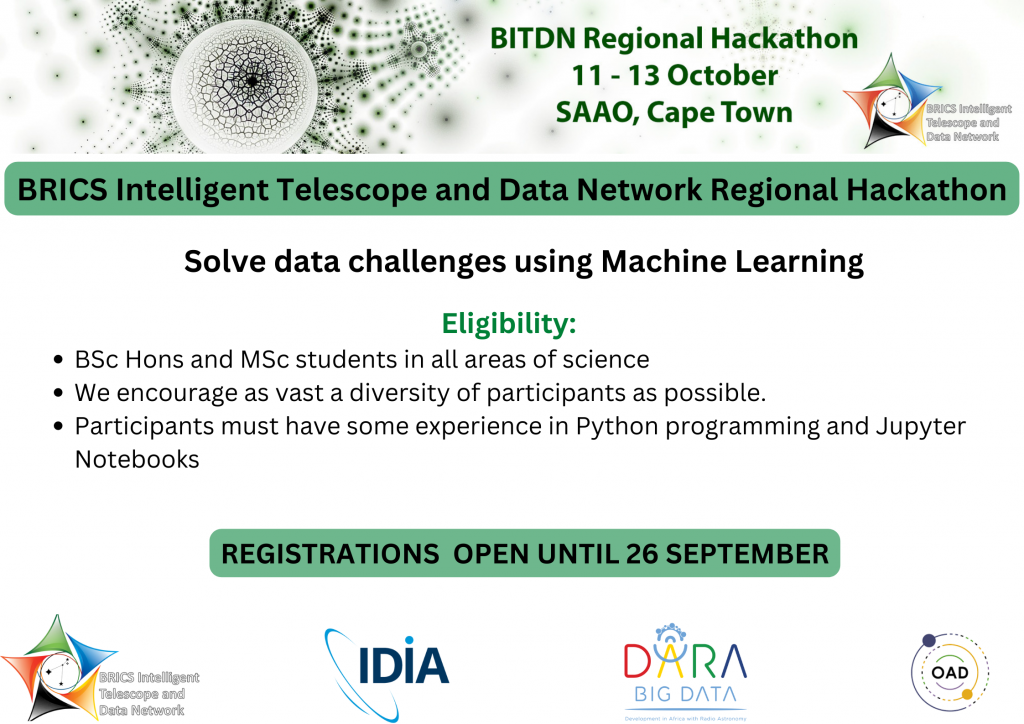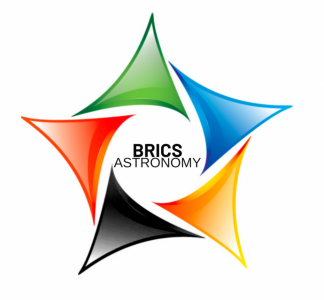The BRICS Intelligent Telescope and Data Network (BITDN) is a partnership between the Inter-University Institute for Data Intensive Astronomy (IDIA) and the South African Astronomical Observatory (SAAO) under the BRICS Astronomy programme. The project looks to impact positively on society through various initiatives including hackathons. The first BITDN regional hackathon will take place in Cape Town, South Africa, at SAAO on 11-13 October 2022. It is envisaged that similar hackathon events will then follow in the BITDN partner countries.
The hackathon is for Honours and Masters students in all fields of science who wish to gain experience in Data Science and Machine Learning. The event will feature a few talks from experts in the field and will be centred around teamwork, peer learning and fun as the participants solve data challenges using machine learning.
Format
The in-person event will start with a few introductory interventions about data science, both in academia and in industry. Then the participants will form teams of 5, and will start working on one of two data challenges involving machine learning:
- (i) A sentiment analysis of Twitter messages. This is for example something that companies would use to measure public opinion on one topic or another.
- (ii) An agritech analysis of the quality of apples. This is an example of how technology assists agriculture in the age of the 4th industrial revolution.
The data challenges themselves start with tutorials, explaining the problem, with exercises for the participants to complete. When the tutorials are done, the teams will have a final task where they use their newly acquired knowledge and skills to solve a problem of their choice.
After the hacking, teams need to prepare a presentation of their results on the task to a panel of judges. The judges then declare a winner and a runner-up, who win prizes.
Sounds a bit daunting? No problem! There will be tutors there who will assist the teams with the tutorials and the tasks. Also, the teams are not judged only how they solved the final task, but on all the aspects that make a hackathon a great learning event, for example team work, how much learning happened, how well you presented your results, etc. The key being that prizes or no prizes, everyone gains something from taking part in this event, even if it’s just new friends!
Timeline and Logistics
The BITDN Regional Hackathon is taking place at the South African Astronomical Observatory. Participants should arrange their own transport, but we will offer a small transport subsidy. Participants are strongly encouraged to bring their own laptops, but if they do not have a laptop, we will set up a few computers for the participants. There are two tea/coffee breaks each day and a lunch, which are provided. On the second day, supper will also be provided on site. There is no accommodation.
- Registration open until 26 September
- Attendance confirmation 30 September. Maximum number of participants: 30
- Event 11 – 13 October
Registration
Eligibility: BSc Hons and MSc students in all areas of science are welcome. We encourage as vast a diversity of participants as possible. Participants must have some experience using Python and Jupyter Notebooks.
Registration and more information on the Hack4dev website.
___________________________________________________________________________________________________
BITDN Regional Hackathon – 2022
The inaugural regional Hackathon event hosted by the BRICS Intelligent Telescope and Data Network (BITDN) marked a significant milestone in collaboration between the Inter-University Institute for Data Intensive Astronomy (IDIA) and the South African Astronomical Observatory (SAAO) under the BRICS Astronomy programme. Held from October 11 to 13, 2022, at the SAAO, this event was part of the Hack4dev initiative, a partnership encompassing organizations like OAD, AfAS, ilifu, and Dara Big Data. Its primary objective was to cultivate data science skills and leverage them to address development challenges.
With a total of 27 participants, including Honours, Masters, and PhD students from diverse scientific backgrounds, the event fostered a collaborative environment for skill enhancement. Equipped with a basic understanding of Python and Jupyter Notebooks, the participants received guidance and support from five experienced tutors.
The program featured enlightening talks by esteemed experts in the field. Notable speakers included Prof Christopher Thron from Texas A&M University-Central Texas, who discussed Data Science in Academia, Luan Africa from the University of the Western Cape Technology Transfer, who provided insights into the Data Science industry and entrepreneurship for students, and Paul Kennedy from Zindi, who shared valuable lessons learned on the journey from basic research to tech entrepreneurship. The opening address was delivered by Mr Takalani Nemaungani, the Chief Director of Astronomy from the Department of Science and Innovation.
The hackathon fostered a spirit of teamwork, peer learning, and enjoyment as participants collaborated to tackle data challenges using machine learning techniques. Rather than emphasizing competition, the event focused on skills development, leaving participants with a profound sense of personal growth. Through engaging in tasks, working cohesively in teams, and acquiring valuable skills and knowledge, the participants were empowered to excel beyond their previous capabilities.
The success of this event exemplified the transformative power of collaborative efforts and skills development. It not only advanced participants’ proficiency but also instilled a sense of empowerment and motivation to tackle future challenges. The BITDN regional Hackathon epitomized the collective commitment to nurturing talent, leveraging data science for societal progress, and driving innovation within the BRICS Astronomy community.
More information about he hackathons can be found on the Hack4dev website.

-
Mission of the BRICS Astronomy Working Group
-
The mission of the BRICS Astronomy Working Group is to promote cooperation between BRICS member countries in the field of astronomy and enabling technologies through joint activities of government, universities, research institutions, and industry, as relevant, to develop astronomical sciences, generate new knowledge, train human capital, develop new technologies and applications, and improve public understanding of science.
